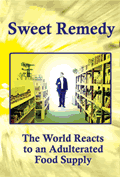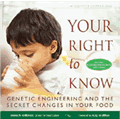THE DEATH STAR ARRIVES
by
Attorney Scott Tips, JD
August 9, 2012
NewsWithViews.com
The Empire Shoves Ractopamine Down Our Throats after Razor-Thin Vote

It sounded like doom. After having taken a vote by secret ballot on July 5th, the Chairman of the Codex Alimentarius Commission, Mr. Sanjay Dave, solemnly announced the results of the voting on whether or not ractopamine[1] standards were adopted. Out of 143 ballots cast, the vote was 69 for ractopamine, 67 against ractopamine, with 7 abstaining. If only one vote had shifted from the “for” camp to the “against” camp, then the result would have been completely different and the ractopamine standard would have been defeated.
This voting was forced upon the Commission by the harping insistence of the United States, Canada, Costa Rica, and Brazil that the long stalemate over the adoption of a standard for Ractopamine MRLs (Maximum Residue Levels) could not be resolved through the Codex-preferred process of “consensus” but would, after all, have to be voted upon.
The Greedo Drug[2]
Among the many standards and guidelines being discussed by the Codex Alimentarius Commission at its 35th session in Rome, Italy during the sun-drenched week of July 2-7, 2012, was this highly charged one for ractopamine – a beta-agonist drug given to pigs, turkey, and cattle to promote their protein and weight gain before slaughter.
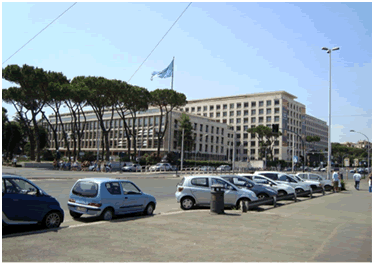
FAO Building,
Rome, Italy
This veterinary drug, developed and owned by Eli Lilly’s Elanco Technology, takes nutrients away from fat production and pushes them instead into muscle, creating a leaner and ostensibly more-valuable animal. While the U.S. Food and Drug Administration (FDA) approved this drug for animal use in 2002, three years later it sent Elanco a warning letter accusing the company of withholding critical information that had led to approval.[3]
Most of the World’s countries (some 160 at last count) wisely do not allow ractopamine-doped meat to be sold within their borders. Especially strict is the European Food Safety Authority (EFSA), which has found that ractopamine constricts blood vessels and quickens the heart.[4] EFSA also has strong concerns about the drug’s carcinogenicity as well as its stressing and other adverse effects on the animals given the drug. As for humans, since there is no clearance period of two weeks prior to slaughter as with other veterinary drugs to rid the meat of drug residues, consumers are being medicated with ractopamine residue when they eat the treated meat.[5] The Chinese Government has spent many millions of Yuan in studies of the health effects of ractopamine and, convinced of its health risks, has banned both its import and export.[6] As a further nail in ractopamine’s coffin, EFSA and its member States have a very sensible public-health policy against drugging healthy animals just for steroid-like effects.
Yet, JECFA[7] conducted its own industry-influenced assessments of the risks of ractopamine and established MRLs for ractopamine residues that have been seized upon by the drug’s promoters as “proof” of its safety.[8] Mentioning JECFA’s reports as frequently and fervently as drug addicts mainlining on heroin, the pro-ractopamine group conveniently overlooks the fact that JECFA’s study groups consisted of only six healthy human males and a band of monkeys (the embarrassing dog study having been slyly omitted from the reports). They also overlook the fact that JECFA’s science is based only on industry studies. JECFA science is often both political and highly suspect, a fact that escapes most Codex delegates.[9]
Victory is Never Final at Codex
For those of you who have been following the ractopamine drama at previous Codex meetings, you already know that the National Health Federation (NHF) has been fighting the adoption of this standard for years. At one Codex meeting, NHF read the warning label, word for word, which clearly prohibits use by humans, from the ractopamine packaging to the entire Codex Commission delegates. At the same meeting, as well as others, we flaunted Codex protocol by also harshly denigrating JECFA’s poor excuse for “science,” which is nothing more than regurgitated industry studies spoon-fed to JECFA and then recycled back to the Codex delegates with an untouchable religious aura surrounding it.
The ractopamine standard, though, should never have even made it this far – to the final Step 8 of the eight-step Codex process for approval – but for the United States’ own extremely suspect actions. The U.S. is the host country for the Codex Committee on Residues of Veterinary Drugs in Foods (CCRVDF) – the committee that created and debated the adoption, at the committee level, of the ractopamine standard before it was passed up to the Commission for final approval and adoption. Unfortunately, at the critical stage of its adoption by the Committee, the U.S. government reportedly refused to approve the visas for the Chinese scientists who were planning to attend the meeting and present their own science showing the dangers of ractopamine! When I mentioned this fact during the ractopamine debates at the Commission meeting in Geneva in 2010, the Chinese delegates nodded their heads in agreement.
Along with the European Union (EU), Russia, China, Turkey, Iran, Norway, Switzerland, and many other delegations, all of whom have been firmly opposed to the adoption of a standard for ractopamine that would permit WTO trade challenges against existing ractopamine bans, NHF had helped to successfully stop its adoption at this, its final, ultimate step. And at last year’s Codex meeting in Geneva, Switzerland, the United States, Canada, and others had forced the issue to a vote and lost – by only five votes; but like flies on a carcass, they kept coming back for more.
Compromise?
One of the flaws with the Codex process is that there is rarely, if ever, the final defeat of a proposed standard. As long as any delegation or group of delegations wants to keep pushing that standard, then it can lose vote after vote and still win. But once the standard is adopted, that is final; and there is no revisiting of that adoption decision to reverse what was even obviously a bad decision. That is why it is so important to never allow bad standards to be adopted at Codex. Unfortunately, that is exactly what happened with the ractopamine standard.
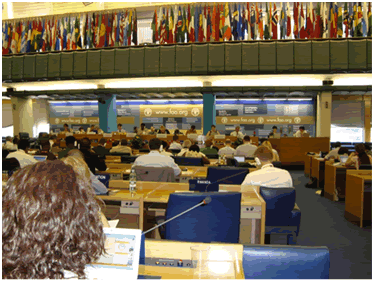
View towards
Podium of CAC Meeting in Rome July 2012
Despite various attempts to negotiate – Codex calls it “facilitate” – a compromise between the two opposing camps, those efforts failed completely, just as I had publicly predicted long ago. How does one compromise between having poison in your food and not having poison? You either do, or you don’t. And as NHF has argued over the years at Codex meetings, it is absolutely insane to study any toxin, poison, chemical, whatever you want to call it, in isolation and then declare it safe. These days, people are exposed to numerous different chemicals and electromagnetic energies that our grandparents were not; and the interaction among these chemicals and their cumulative effects upon the body are still unknown.
The last example of an attempt to arrive at consensus occurred during a special "facilitated" session that was held from 8:00 a.m. to 9:30 a.m. on the second day of the week-long meeting.[10] The Chairman projected onto large screens in the room six different options for dealing with the ractopamine stalemate. Cleverly, the U.S. and its sidekick Canada wanted the six proposed options deleted and reduced to a simpler, black-and-white, two-option choice. To my mind, it was simply their strategy to reduce the issues to two options that delegates could then vote on either thumbs up or thumbs down.
During the debate on these options, NHF was the third-to-last to speak that morning; and I had the opportunity to refute some of the arguments made by South Africa and Antigua, who respectively had argued that we should just "note our objections and move forward" and "not offend the Experts by not accepting their opinions, otherwise they will stop giving them to Codex"! In my warmest way, and among other things, I said that “Codex should never just blindly accept the Experts' opinions – some you might accept, others you do not. The experts did not have all of the data and their conclusions are flawed as shown by the fact that more than 70% of the World's pork-consuming countries oppose ractopamine doping of their food. The "way forward" does not mean continuing on the same false path but in wisely retracing one’s steps back until the correct path is found.”
The facilitated session ended, as had all of the others, with no consensus on ractopamine. But, as it turned out, finding consensus on ractopamine at this meeting had never been in the game plan for the pro-ractopamine forces.
The Empire Strikes Back
The Fourth of July saw fireworks of the verbal kind with numerous statements by the country delegates as to their respective positions either for or against the ractopamine standard. But, amazingly, when the Chairman first asked for comments from the floor, there was an awkward, extended silence as no delegation wished to be the first to speak. The Swiss delegate finally ended the calm when he fired the opening shot of the day’s debate, bluntly stating, “There are two risks here. Risk Number 1 is in using anabolizing drugs that affect health. Risk Number 2 is that the use of ractopamine will increase consumer distrust and they will feel cheated by the system that is supposed to protect them. If there is no consensus, and this standard is adopted, then Switzerland might withdraw from Codex.”
The delegate for the Netherlands, Mr. Friedericy, gave a scathing speech against ractopamine, on the order of what NHF itself had planned to say somewhat less diplomatically when its turn to speak came. Among other things, he denounced the commercial interests that were promoting ractopamine over true health, arguing:
“When we now accept that Codex Alimentarius is used as a backdoor to force a large part of the World to allow food products from another large part of the World which contain certain products, the use of which is diametrically opposed to what our consumers expect from safe food, and in no way contributes to the health or well-being of that consumer, the Codex Alimentarius will lose its credibility as an international body to promote food safety and as a protector of consumers’ health. And despite all the splendid work for mankind that Codex has done in the past and may be doing in the future, it will be regarded by the ordinary citizen as a tool for foreign industries to force unhealthy products down their throats.”
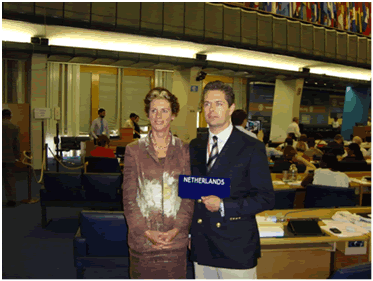
Dutch delegate
Mr. Friedericy with colleague
But those words of wisdom, and others, were unfortunately smashed by the World Health Organization (WHO) representative Angelika Treitscher, who, sitting at the head table with a mantle of scientific authority that was neither deserved nor merited given her words, firmly drove a stake into the heart of the objectors when she summarily took the floor and pontificated that the JECFA review had shown ractopamine to be safe and that any opposition to the adoption of a ractopamine standard was not based upon health concerns.[11] At that, the room erupted into applause by those pro-ractopamine forces which themselves, curiously enough, had cynically swept all health concerns under the rug and then were busy calculating their profits from increased pork and other meat sales throughout the World.
Her words clearly comforted those pro-ractopamine delegates who, in lie after lie, had lamented how badly the World "needs" ractopamine to feed the hungry millions and how the science "proves" this animal steroid drug is safe. Yet, between those arguments and reality lay an astonishing darkness, which no amount of reason could illuminate.
The debate went back and forth between the pro-ractopamine forces (essentially all of the Western Hemisphere, plus Australia, New Zealand, and most of Africa) and the anti-ractopamine forces (the Eastern Hemisphere minus most of Africa) until the Chairman abruptly and unilaterally cut off any further discussion, leaving 36 country delegations and 2 INGOs (the National Health Federation and Consumers International) without any opportunity to share their views on this issue.
This decision was especially unfortunate because both NHF and CI were once again prepared to speak out strongly against the WHO representative’s unsupported comment that “Science” supported the safety of ractopamine in the food supply. The Chairman’s abrupt decision to cut off discussion also stood in sharp contrast with that of the previous Codex Chairwoman, Karen Hulebak, who had permitted a much fuller discussion of the delegates’ views, no matter how unpopular they might have been.
When the Chairman stated his view that “there is clearly no consensus” and that the Codex Procedural Manual states that we should adopt standards by consensus, it seemed as if the standard might fail. But the Chairman then recognized Ghana to speak on procedure, and that country announced – again to applause – that Codex Procedural Manual Rule 12 calls for a vote in those cases where consensus cannot be reached.
The European Union and other delegations – firmly opposed to the adoption of a standard for ractopamine that would permit WTO trade challenges against existing ractopamine bans – challenged the need for a vote, as they knew that the United States, Canada, and others had been lobbying Codex countries since last year to support ractopamine use throughout the World. If the ractopamine standard were to be decided upon by consensus alone, then it would be defeated; however, if it were voted upon, then there was the strong risk of it being adopted.
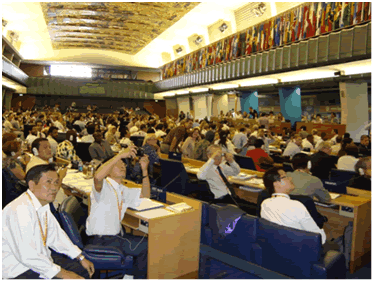
Codex delegates
looking at the Voting Board
In a late-evening Codex session held on July 4th, and in a reprise from last year's vote, the first vote was to decide whether a secret ballot or an open ballot vote would be taken on whether to vote or not. The pro-ractopamine forces wanted the vote to be "open ballot" so as to ensure that "their" votes didn't stray and vote the “wrong” way. The EU, the NHF, and many others wanted a vote in secret to allow delegates to vote their consciences. This vote, the anti-ractopamine won by 93-41. But the next vote – on whether to submit to a vote the adoption of the ractopamine standard – was won by the pro-ractopamine forces, 68 to 64.
Clearly jubilant and sensing blood (and most certainly wanting to have a Fourth of July victory to celebrate), the U.S. delegate Darci Vetter pushed for the meeting to continue so that the vote could be held that night. The Chairman, noting the hour hand resting on nine, wisely refused.
Darth Vader
This year’s U.S. delegate in chief, Darci Vetter (whose name sounds eerily similar to a sinister George Lucas Star Wars character), had clearly been working the delegate crowd before and during the meeting. By misrepresenting the science and telling everyone it's about "Food Security" (a code word for "let's unload more of our junk food on the World"), she and her sales crew corralled widespread support from many developing-nation delegations, which mistakenly look to the U.S. for global leadership.
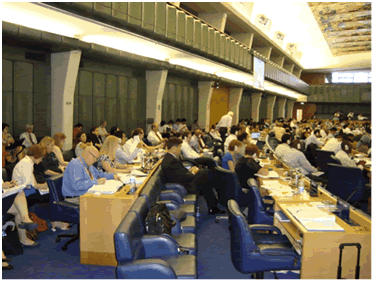
The U.S.
Delegation at the Codex Meeting in Rome
All of the Western Hemisphere was sewn up solid in the pro-ractopamine court, from Canada down to Argentina and Chile. And to the surprise of many, among the biggest and most vocal supporters of ractopamine were the anti-American countries of Venezuela and Cuba. Since the previous Codex Commission meeting, and probably with U.S. and others’ threats and promises still ringing in their ears, all of Africa had defected to the ractopamine camp (except for staunch Kenya, Egypt, Zimbabwe, and Libya).
I wish I had been a fly on the wall during the many discussions the U.S. had had with the undecided Codex delegates. One can only speculate as to the promises and/or implied threats that were made to such postage-stamp nations as Tonga (pop. 104,000) and St. Kitts and Nevis (pop. 53,000, sopping wet) for them to come to Italy, eat pizza, and vote the American way. When you realize that Tonga and St. Kitts and Nevis each have the same voting power as China and India, you start to see the absurdity of the pro-ractopamine delegates’ calls for "voting." This is not democracy in action, this is pure Theatre of the Absurd. Why a back alley in Beijing has more people than St. Kitts and Nevis! The political blowback on the U.S. and its sidekick Canada from this travesty will be enormous - perhaps sooner rather than later.
And just when we could not imagine the U.S. becoming any more overbearing, it happened. The night before the final vote, the U.S. Ambassador in Rome reportedly spent his time from 9:00 p.m. until 9:00 a.m. the next morning calling Codex delegates to lobby for their support. In some cases – our sources report – he, or someone, instructed countries (such as Georgia) to vote the U.S. way or else.
The Ugly American turned from fiction to reality at Codex.[12] But Darth Vader and her troops were not the only villains in this tragi-comedy. The Special Villains for pushing this Greedo drug on the World also include Canada, Brazil, Costa Rica, Panama, Cuba, Ghana, Nigeria, Japan, Argentina, Chile, Mexico, the Philippines, and WHO. I only hope that their children and grandchildren will be healthy enough to forgive them all for putting money before health.
The Vote and Aftermath
As already known, the vote was taken and the ractopamine standard was adopted by a razor-thin margin. If only one vote had changed sides, then the standard would have lost and not been adopted. Yet, ironically, it would still have lived on to be debated at next year’s Commission meeting. Yes, that’s right: In this rigged game, if ractopamine won this year, then the standard is adopted. Had it lost, then the fight to get it adopted would just continue until the anti-ractopamine forces are worn down, bought out, or simply out-voted. In the warped universe of Codex what passes for democracy is nothing more than an obsessive death wish to pass food standards – healthy or unhealthy, it doesn’t matter – at all costs so as to preserve Codex “credibility.”
Those who voted for ractopamine were hardly profiles in courage – in fact not even profiles at all. The disgusting exchange of “thumbs up” signals between Darth Vader and the Israeli delegate, which I witnessed, as the latter arrived and slithered into her seat at the very last minute in time to vote for the adoption of the standard is just one example of such unprincipled action that week.
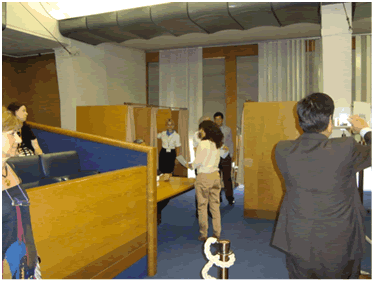
The delegates
filed in one at a time to vote on ractopamine
The true profiles in courage were those who spoke out strongly against the ill-health that ractopamine represents and who challenged the holy word of JECFA, which had already promoted the ractopamine standard to sainthood. Those individuals are too numerous to mention here; but Ella Strickland and Eva Zamora, who led the EU delegation, deserve special mention since they were the fulcrum around which all opposition was balanced and they so often spoke true and from the heart about the health dangers posed by ractopamine.
After the vote was announced, and China and Norway had expressed their strongest objection and disappointment with the vote, Ms. Strickland spoke for the EU, calmly saying, “The EU has repeatedly stated that there is no justification for ractopamine. Let me be clear, the EU’s current legislation will remain in place. Further serious reflection is warranted here, and Codex was not well-served here by this voting.”
In turn, the U.S. delegate said, “We are pleased that the Commission could move forward but we take no pleasure in how it was accomplished. We thank the delegates for using all of the tools that we have here when there is no consensus. We want decisions on food-safety science.”
Others – Kenya, Egypt, Turkey, Croatia, Iran, Switzerland, Russia, and Zimbabwe – registered their strongest reservations about and disgust with the outcome of the vote. In all my many years of participating in Codex meetings, I have never seen a sharper divide among the delegates on an issue.
The Death Star on Station
With the ractopamine standard in place and two other bad ones on the way,[13] the food markets of the World look primed for change. Most of the World is not happy and they will resist what happened at Codex that senseless week.
| Subscribe to the NewsWithViews Daily News Alerts! |
The narrow vote reflects the absurdity and vulnerability of Codex. We have less than 30% of the World’s pork-consuming countries dictating standards to the other 70% plus of the World. The European Union, Norway, Switzerland, Turkey, Russia, Kenya, and China correctly argued throughout that the science on Ractopamine was not settled, that this standard was not about health but about pushing commercial profits instead, and that Codex would be damaged by the adoption of this unhealthy standard. In fact, that is exactly what will unfold as a result of the Commission’s decision: Codex has lost whatever scientific credibility it ever had, even amongst those who have been its biggest supporters. Despite especially the EU representatives’ herculean efforts – and they are truly the unsung heroines of the day – bad science and ill-health prevailed, and the World is a worse place for it.
NHF predicts that today’s adoption of a standard for Ractopamine MRLs will lead to trade challenges by the United States against China and by Brazil against the European Union to crack open those consumer markets to Ractopamine-doped meat products. The victory of the United States today in pushing the wishes of its commercial masters – and certainly not those of its citizens, most of whom oppose Ractopamine-doped foods – may very well backfire on that country and its minions as a chain reaction of events unfold, the full scope of which no one here yet knows.
� 2012 - Scott Tips - All Rights Reserved
Footnotes:
1.
Ractopamine is a steroid-like vet drug, the residues of which remain
in the slaughtered animal to then be consumed by meat-eaters.
2.
“Greedo,” with its double meaning, is probably the best
name to give this drug. Greedo was the Star Wars bounty hunter who tried
to kill Han Solo at the Mos Eisley Cantina, but was killed instead.
At the same time, greedy farmers using this drug expect a net return
of $2.00-3.00 per pig sold, a pittance compared to the harm done to
animals and humans from this toxin.
3.
The 14-page letter read in pertinent part: “Our representatives
requested a complete and accurate list of all your GLP [Good Laboratory
Practices] studies involving Paylean® (Ractopamine hydrochloride),
including their current status as well as the names of the respective
study monitors. In response, your firm supplied to our representatives
multiple lists which differed in the names of the studies and their
status. In addition, your firm could not locate or identify documents
pertaining to some of the studies. This situation was somewhat confusing
and created unneeded delays for our representatives.” Moreover,
the letter asks: Where was mention of the farmer phone calls to Elanco
reporting, "hyperactivity," "dying animals," "downer
pigs" and "tying up" and "stress" syndromes.
Where was the log of phone calls that included farmers saying, "animals
are down and shaking," and "pig vomiting after eating feed
with Paylean"?
4.
The EFSA Journal (2009) 1041, 1-52, at [Link],
accessed August 1, 2012.
5.
As much as 20% of Paylean (given to pigs for their last 28 days), Optaflexx
(given to cattle their last 28 to 42 days), and Tomax (given to turkeys
their last seven to 14 days), remains in consumer meat, says author
and well-known veterinarian Michael W. Fox. (See [Link],
accessed August 1, 2012.)
6.
See [Link]
accessed August 1, 2012.
7.
JECFA is the acronym for the Joint FAO/WHO Expert Committee on Food
Additives, and is the Codex-spawned expert group upon which Codex Committees
rely for expert scientific opinions in forming Codex standards.
8.
JECFA’s risk assessments were undertaken in 2004, 2006, and 2010
and provided its recommended MRLs for Ractopamine (Ractopamine hydrochloride)
in the target tissues (muscle, fat, liver, and kidney) for cattle and
pigs.
9.
Far too many Codex delegates blindly worship at the false altar of JECFA
science, believing that JECFA, like some ancient Greek oracle, infallibly
proclaims the truth. This religious adulation of JECFA amongst delegates
supposedly trained in science is one of the most incongruent aspects
of Codex this writer has ever encountered.
10.
This facilitated session followed the one-day facilitated session chaired
by CAC Chairman Dave (pronounced “Dah-vey”) in Paris, France
on April 5, 2012, during a break in the meeting of the Codex Committee
on General Principles. NHF attended that meeting and made a strong statement
against the adoption of the ractopamine standard.
11.
It is important to note that when EFSA had pointed out the fatal flaws
in the JECFA Report on ractopamine, JECFA simply declared that EFSA
had not presented any “new data” and EFSA’s concerns
were summarily rejected. That is not how scientific review and debate
is conducted in the real world. In the real scientific world, JECFA
would have had to respond and/or correct the flaws, regardless of whether
EFSA’s critique presented any “new data” or not.
12.
One example of utter pettiness stems from Darth Vader not liking a particular
response that the FAO Legal Counsel David Byron had given at the meeting
(when she had asked what “holding Ractopamine at Step 8 pending
further action by Codex” meant). He had responded, in a polite
tone and manner, that it simply meant that, as with all Codex standards
held at Step 8, the Commission could then take action at a later date.
Offended, she then complained to Mr. Byron’s boss about his comment.
13.
At this same Codex meeting, the Commission agreed over many strenuous
objections to revive and put back on track the standard for recombinant
Bovine Somatotrophin (bST) as well as commence review of a standard
for Zilpaterol hydrochloride. The latter is another steroid vet drug
that makes ractopamine look tame by comparison. The NHF spoke out against
both of these drugs.


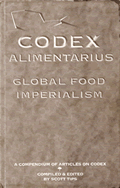



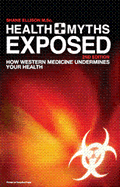





 Share
This Article
Share
This Article




